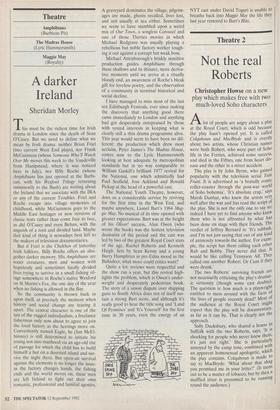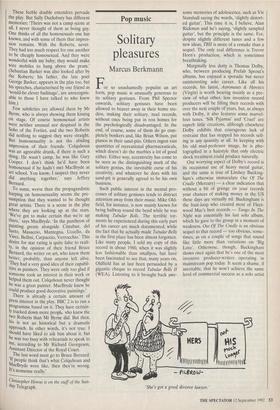Theatre 2
Not the real Roberts
Christopher Howse on a new play which makes free with two much-loved Soho characters Alot of people are angry about a play at the Royal Court, which is odd because the play hasn't opened yet. It is called Colquhoun and MacBryde and is overtly about two artists, whose Christian names were both Robert, who were part of Soho life in the Forties, achieved some success, and died in the Fifties, one from heart dis- ease and the other in a street accident. The play is by John Byrne, who gained popularity with the television serial Tutti Fnitti. It is advertised as 'a brutally comic roller-coaster through the post-war world of Soho bohemia'. 'It's absolute crap,' says Marsh Dunbar, who knew the artists very well after the war and has read the script of the play. She is not the only one to say so; indeed I have yet to find anyone who knew them who is not affronted by what has been done on stage with their friends. The verdict of Jeffrey Bernard is: 'It's rubbish, and I'm not just saying that out of any kind of animosity towards the author. For exam- ple, the script has them calling each other Rab and Bobby. They never did that. It would be like calling Tennyson Alf. They called one another Robert. Or Cunt if they were drunk.' The two Roberts' surviving friends are not necessarily criticising the play's dramat- ic virtuosity (though some cast doubts). The question is: how much is a playwright entitled to mess around with the facts of the lives of people recently dead? Most of the audience at the Royal Court might expect that the play will be documentary, as far as it can be. That is clearly not the approach. Sally Ducksbury, who shared a house in Suffolk with the two Roberts, says, 'It is shocking for people who never knew them, it's just not right.' She is particularlY annoyed by the camp tone, combined with an apparent homosexual apologetic, which the play contains. Colquhoun is made to say to MacBryde: 'What about that shag you promised me in your letter?' (It turns out to be a matter of tobacco, but by then a muffled titter is presumed to be running round the audience.)
These feeble double entendres pervade the play. But Sally Ducksbury has different memories: 'Theirs was not a camp scene at all. I never thought of them as being gay. One thinks of all the homosexuals one has known, and with some of them that impres- sion remains. With the Roberts, never. They had too much respect for one another to be cheaply homosexual. And they were wonderful with my baby; they would make wire mobiles to hang above the pram.' (Sebastian Barker was also looked after by the Roberts; his father, the late poet George Barker, appears in the play too, but his speeches, characterised by one friend as 'would-be clever badinage', are unrecognis- able to those I have talked to who knew him.) Few subtleties are allowed them by Mr Byrne, who is always showing them kissing On stage. Of course homosexual artists were neither unusual nor despised in the Soho of the Forties, and the two Roberts did nothing to suggest they were straight. But homosexuality is not the abiding impression of their friends: `Colquhoun was an agreeable drunk, if there is such a thing. He wasn't camp, he was like Gary Cooper. I don't think he'd have been homosexual if he hadn't met MacBryde at art school. You know, I suspect they never did anything together,' says Jeffrey Bernard.
To some, worse than the propagandistic harping on homosexuality seems the pre- sumption that they wanted to be thought great artists. There is a scene in the play where they are looking up at the stars. 'We've got to make certain that we're up there,' says MacBryde. 'In the pantheon of painting greats alongside Cimabue, del Sarto, Masaccio, Mantegna, Uccello, da Vinci, Bellini, Carpaccio, Verrocchio.' This desire for star rating is quite false to roll- tY, in the opinion of their friend Bruce Bernard, the writer on art, who knew them better, probably, than anyone left alive. They had a very good idea of their capabil- ities as painters. They were only too glad if sOmeone took an interest in their work or helped them out. Colquhoun never thought he was a great painter. MacBryde knew he Could produce good decorative paintings.' There is already a certain amount of press interest in the play. BBC 2 is to run a programme based on it. They have certain- ly tracked down more peoph. who knew the two Roberts than Mr Byrne did. But then, his is not an historical but a dramatic approach. In other words, it's not true. I Should have liked to ask him about it, but he was too busy with rehearsals to speak to me, according to Mr Richard Georgeson, Assistant Director at the Royal Court. The last word must go to Bruce Bernard: People think that's what Colquhoun and MacBryde were like, then they're wrong. It's nonsense really.'
Christopher Howse is on the staff of the Sun- day Telegraph.



































































 Previous page
Previous page